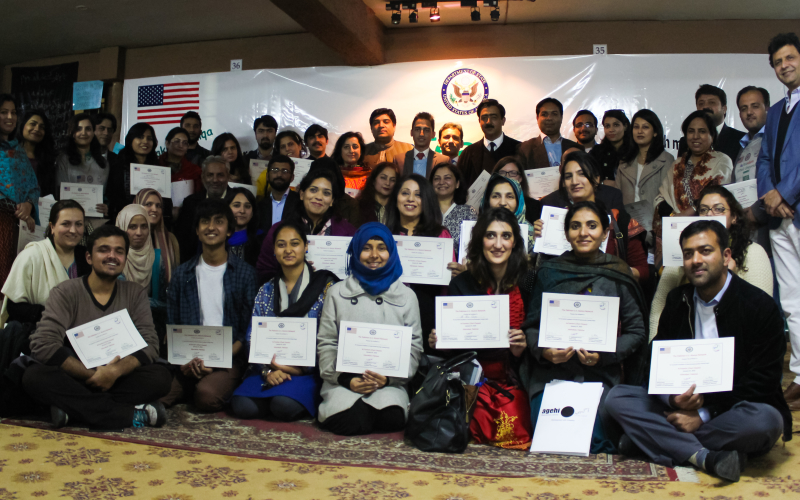By Rimsha Ali Shah
What is a real conversation-starter in Pakistan? Some might say food, but to really narrow it down, cricket and tea or chaye, as it is locally called, is another. Communicating ideas, debating opinions and shaping friendships with the backdrop of a cup of tea at a restaurant or a pop-up roadside tea cart is a sight so common in Pakistan that its impact often goes unnoticed.
But one Legislative Fellowship Program (LFP) alumna, Dr. Rakshinda Perveen, took notice and subsequently she created a one-day training she titled “Acteavism” to mobilize discussion and action towards ending violence against women in Pakistan. This was made possible with the help of the alumni small grant of up to $5,000 USD from the Pakistan-U.S. Alumni Network. All alumni of various U.S. government sponsored exchange programs in Pakistan are eligible to apply for the grant to enable them to give back to their communities.
Dr. Perveen is the pioneering voice against dowry violence in Pakistan and believes in striking innovative pathways to women empowerment by engaging youth and has also published her book “Successful Social Entrepreneur: Heart and Head Together,” under the banner of Creative Anger by Rakshi, dedicated to the youth of Pakistan for bringing out their full potential in a free market economy.
“Acteavism” is a concept coined by Dr. Perveen which combines social entrepreneurship with activism to denounce gender-based violence, particularly dowry violence, and empower women. It was this unique combination of ideas that propelled Tuba Azeem Farooqi, a Global Undergraduate Exchange Program (UGRAD) alumna, to apply for this training.
“I wanted to learn what ‘Acteavism’ meant. The concept was completely new for me and I was intrigued to learn more.”
Brewing Entrepreneurs
When Dr. Perveen asked the participants whether they were “high-risk takers,” Fatima Lodhi was first to raise her hand. Lodhi founded the anti-colorism campaign “Dark is Divine,” which has gradually evolved in to one of the most highly regarded youth activism movements around the world. Lodhi and the other participants were divided in to groups based on their area of expertise and took part in several interactive discussions, the first on the principals of social entrepreneurship, and the second on violence against women, particularly dowry violence in the South Asian context to acquaint participants with the violent reality many women face.
Afterwards, these confident risk-takers were assigned a mentor and put their entrepreneurial skills to test with the help of a special tool, aptly dubbed the “Chaye Cart.” The group was divided in to two teams and each had to develop an effective plan which embodies the essence of fighting gender-based violence, while also maintaining decent profit margins.
“We had to come up with messages that served two purposes: propelled customers to spend money and also create awareness on the importance of gender-balance,” said Rida Ali pointing to the tea-cart that was donned with messages supporting gender-balance and women’s empowerment.
Once participants developed a strategy, they took their Chaye Cart and newfound skillset out to the hustling-bustling area of F-8 Markaz, Islamabad. The teams each had one hour each to augment their sales and maneuver potential customers to their Chaye Cart for a cup of tea and subsequent discussion on women’s empowerment.
While some enticed the pedestrians with catchy slogans, others tried story-telling. One participant said, “We had written ‘special arrangement is available for women’ since this statement is so commonly used to provide a comfortable environment to the female customers. However, we were forced to reconsider writing it when one of our female customers actually pointed out to us that we were going against our premise of gender equality by that statement. A discussion on gender-based violence ensued and then we cut off ‘special,’” pointing to the cart, “since treating men and women equally means to stop excluding one gender from the social life’.”
For many participants, the market place environment and business dynamics of a simple tea-cart sparked their entrepreneurial fires. Madeha Raza, founder of “Women through Film,” an initiative to empower women, found the workshop a refreshing change to how women empowerment is usually pursued. “Not only was Dr. Perveen’s enthusiasm and motivation contagious, but I also had the opportunity to connect with youngsters passionate to make change happen. I have them onboard with my initiative and we’re working together now to empower women through film.”
Kashif Khan, President of the Global Entrepreneurship Week in Pakistan, encouraged the fifty aspiring entrepreneurs and activists to continue to stoke the fire ignited by their Acteavism training: “You have the power to make change in the lives of many through your innovation.”
To view pictures from the activity, click here.

